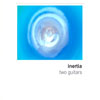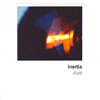 Paul Taylor and Kevin Tomkins have been working together for well over 25 years, most notably as the notorious power electronics duo Sutcliffe Jugend. After a few reinventions of that project, they emerged a few years ago as simply SJ and created two albums, Between Silences and Threnody for the Victims of Ignorance that channeled the same dark atmospheres and tension, but expanded to more instrumentation than just raw synths and screamed vocals. This evolution has continued into Inertia, where guitar is the main instrument, but along with piano, clarinet, and other traditional instruments, to create dark and disorienting audio paintings.
Paul Taylor and Kevin Tomkins have been working together for well over 25 years, most notably as the notorious power electronics duo Sutcliffe Jugend. After a few reinventions of that project, they emerged a few years ago as simply SJ and created two albums, Between Silences and Threnody for the Victims of Ignorance that channeled the same dark atmospheres and tension, but expanded to more instrumentation than just raw synths and screamed vocals. This evolution has continued into Inertia, where guitar is the main instrument, but along with piano, clarinet, and other traditional instruments, to create dark and disorienting audio paintings.
The first of these simultaneously released albums, Two Guitars, is exactly that: the 11 tracks that comprise the disc is based exclusively on the guitar playing of Taylor and Tomkins. Tracks like "Only Walking" and "Paradox" hover barely audible, with understated melodic guitar playing setting the mood, the former mixing with clanging strings and distorted effects, while the latter content to just stay near silence.
Tracks like "Half Life (Remembered)" and "Between Territories" channel 1960s space sound effects through the guitar, with sustained string tones, hammered and bent notes, and a sense of chaos more than control or structure, which are stark contrasts to the simple rhythms of "Lip" and especially "In Memory of a Close Friend (Imagined)." The latter is a beautiful piece of long and slow guitar tones, stretched out to resemble melancholy strings or cello that is somewhat reminiscent, melodically, of Bodychoke’s softer work, but is much tighter and more controlled than most of the other pieces, which all have their fair share of random cuts and blasts.
The two long tracks, "Blue Funk" and "Black Sun," would have fit in nicely in the isolationist scene of the mid/late 1990s, with the dark abstract minimalism and bleak, sparse structures in league with Robert Hampson’s Main or Justin Broadrick’s Final projects, both of which used guitars similarly as raw material.
samples:

Duel, on the other hand, incorporates a wider set of instruments into the same theme, but into a tighter set of two short tracks, and two 20-plus minute ones. The shorter two, "First Duel" and "Third Duel" match Taylor’s guitar with raw, uncomfortable clarinet from Tomkins. The former retains the arid sprawl of the Two Guitars material, while the latter has a definite bend towards the harsher spectrum, bringing in rough electronic shards and guitar feedback.
"Second Duel" layers the nauseous clarinet with buried clattering noises and other unclear sonics, as the time goes on the track becomes darker and more aggressive, with instruments shrieking and groaning in the most uncomfortable ways while the distant rattling rhythm clicks on.
"Fourth Duel" follows a similar path, but emphasizes the noise guitar and feedback, with the addition of harsh electronic elements that resemble the Cold Meat Industries era Sutcliffe Jugend, but with more restraint. The sound is almost that of church music, perverted and processed into something evil and violent, with a sense of mania that is really consistent with their other projects, but the duo is creating completely different sounds.
Inertia has the same chaotic and sinister sound that they fostered through the years as Sutcliffe Jugend, but in a more mature and nuanced way. Rather than relying on angry screams and abused effects pedals, here they allow in a wider variety of approaches and ideas that prove the attraction to their work is not simply because it is dark or menacing, but because it is well structured and designed.
samples:
Read More

